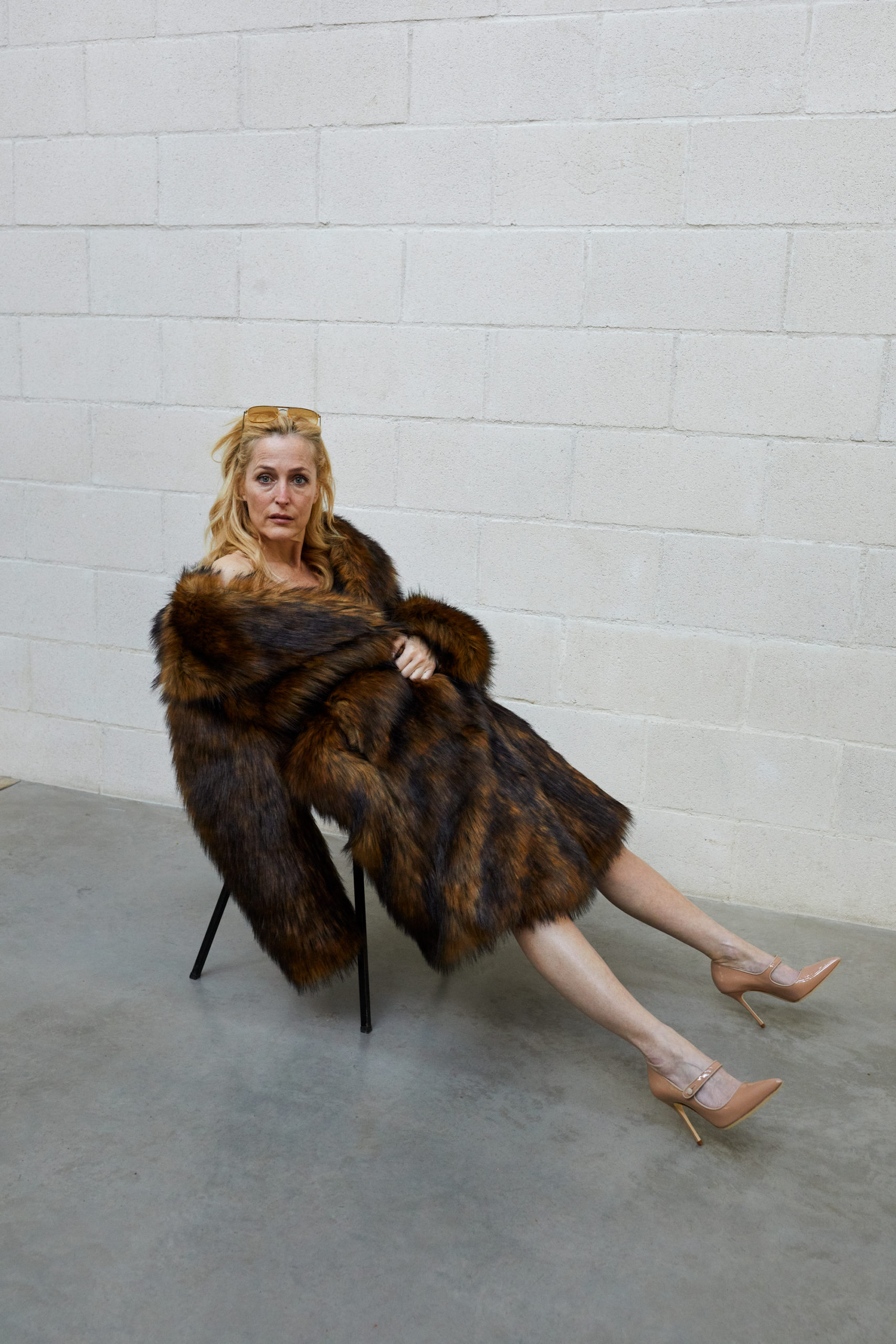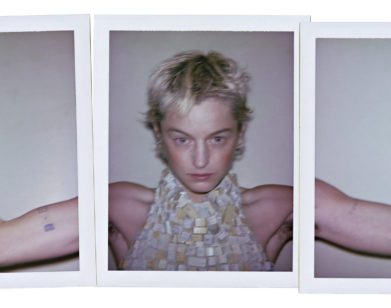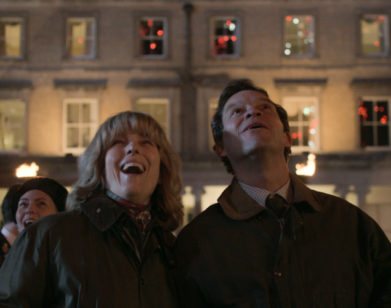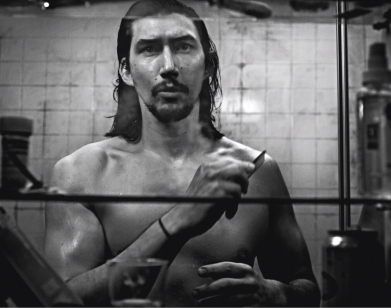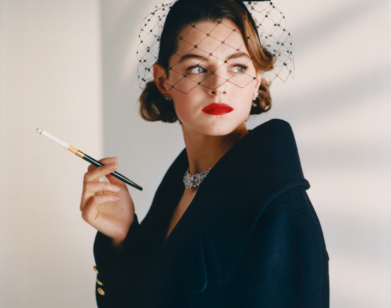IN CONVERSATION
Gillian Anderson and Helena Bonham Carter Have a Very British Chat
The question nags at you: Is Gillian Anderson British or American? Yes, she was born in Chicago, but her family relocated to London shortly thereafter. They came back to the United States before Anderson entered high school, but kept an apartment in England, which they returned to each summer. She trained as an actor at Chicago’s The Theatre School at DePaul University, but also took part in the National Theatre of Great Britain’s summer program at Cornell University. Once Anderson began acting professionally, her roles only deepened the mystery. Anderson became a star as the FBI Agent Dana Scully on Fox’s decade-defining paranormal procedural The X-Files, where, for 11 seasons (seven of them alongside David Duchovny as her partner, the self-deprecating UFO truther Fox Mulder), she confronted all manner of anomalies and conspiracies with deadpan skepticism and a flawless American accent. (In 1997, she accepted an Emmy for Outstanding Lead Actress with one, too.) She’s held her own playing a member of American high society (the tragic Gilded Age socialite Lily Bart in the film adaptation of Edith Wharton’s The House of Mirth) as well as the British aristocracy (Lady Dedlock in the 2005 BBC miniseries Bleak House and Miss Havisham in the 2011 adaptation of Great Expectations). Later in her career, she faced down psychopaths on both sides of the pond, as Hannibal Lecter’s personal shrink in the NBC gorefest Hannibal, and as a detective hunting a serial killer in the BBC Two murder mystery The Fall. Last year, Anderson, who, to further obfuscate the matter, toggles between British and American accents depending on who she’s speaking to, seemingly ended the debate by disappearing into the role of Britain’s Iron Lady, Margaret Thatcher, in season four of the Netflix drama The Crown. A master class in keeping a stiff upper lip, the performance won Anderson a Golden Globe Award. And then, as if the 52-year-old actor has been playing us from the start, she recently signed on to star as none other than Eleanor Roosevelt in Showtime’s upcoming anthology series The First Lady. But first, a chat with the actor Helena Bonham Carter, which, for the record, is about as British as it gets. —BEN BARNA
———
HELENA BONHAM CARTER: Can I ask you, what are you wearing?
GILLIAN ANDERSON: Cotton velvet leggings and a little button-up sweater. It’s one of my three go-to loungewear outfits.
BONHAM CARTER: You’ve got an outfit?
ANDERSON: Well, I’m in pajamas for a while, but I don’t like making French toast for the kids in pajamas, so I change into this.
BONHAM CARTER: That’s good. You’ve got standards in front of your kids.
ANDERSON: I do, and actually, I will put proper clothes on to do the school run. Even if I’m just going to stay in the car, I will actually put proper clothes on. I may have once put my pajama top on and a sweater over it, but nobody knew any better.
BONHAM CARTER: I just want to tell you that I’m wearing your jumper with your lips on it. I don’t know if the readership is aware that you’re, amongst many other things, a designer. What’s your line called and how did that happen?
ANDERSON: It was with Winser London. They asked if I’d be interested in doing my own line, which I did, and which was filled with sweaters and coats and a couple of silk shirts. But the lip thing was separate. It started out with a fan coming up to me wearing my lips on her t-shirt. I said, “That’s so cool, I want one,” and she handed me one. And then I thought, “You know what? I might have these made up at Redbubble and sell them for charity.” I think they ended up donating them all so that almost 100 percent of the money went to charity. Then I decided to do sweaters with lips on them and 20 percent of the proceeds went to Women for Women International.
BONHAM CARTER: What’s Women for Women?
ANDERSON: It’s a charity that helps women who are in post–war-zone situations get back on their feet, understand what their rights are, get involved in some kind of job so that they have a way to make money, and get involved in their community so that they can not only be of service, but maybe help others in the process. When something really moves me, when it gets me in the gut, it feels like something I need to pay attention to.
BONHAM CARTER: Is that your qualification for accepting a part? I presume you’re given lots of choices.
ANDERSON: I’m not sure if it’s gut-level. It’s higher up in the body. It’s when a part of me immediately gets who the person is. Often, as you probably know, you read something and you’re divorced from it. I’ve learned from trial and error not to say yes to things that I don’t intuitively feel like I know how to play. No matter who is directing it, no matter who else is in it, no matter what the money is, if I don’t feel like it’s already inside me somewhere, I’m only going to be crap.
BONHAM CARTER: It’s like that chemical reaction when you meet someone great.
ANDERSON: You’re right. It’s a chemical or cellular reaction that tells you it’s in there somewhere, but you still have to do all the research and digging to find out which part of your body that person lives in. Sometimes you have togo all the way down to your toes, and sometimes you only have to go to your knees. I’m being stupid, but you know what I mean.
BONHAM CARTER: How was it to have Margaret Thatcher hanging around you for so long?
ANDERSON: It’s interesting, because I’ve played other characters who have lingered when I’ve gone home, but I don’t feel like she did. I couldn’t tell you why, because it was an extended period of time. I don’t really feel like she showed up in my personal life. I didn’t find myself suddenly making kedgeree for my children. Blanche [DuBois], on the other hand, I started to gesticulate like her in my private life. I think I went a bit loopy during that period of time, and my kids would attest to that.
BONHAM CARTER: Can they notice a difference in behavior? Are you somebody who practices an accent while you’re making the French toast?
ANDERSON: No, I don’t do anything out loud.
BONHAM CARTER: You don’t practice your lines out loud?
ANDERSON: No. I think that’s probably why it took me so long to get Thatcher’s voice, because I was so nervous to let her out. I don’t know how much of it had to do with failing, or not feeling like she had gestated long enough inside of me to be ready. When I did Great Expectations, I heard Miss Havisham’s voice in my head. That’s something we have in common, isn’t it?
BONHAM CARTER: We have both done Miss Havisham, yeah. We could have a tea party and dress up as her. Or we could just move in together in some fictional house.
ANDERSON: That’s a brilliant idea.
BONHAM CARTER: “Would you like some tea, Miss Havisham?”
ANDERSON: Could you imagine, two old hags on the hill dressed like Miss Havisham? I heard her voice in my head, but I hadn’t ever uttered her out loud until I was in front of the camera. It only occurred to me after the fact. I thought, “Bloody hell, I could have opened my mouth and the director could have hated it.”
BONHAM CARTER: The fear of the first day is a horrific thing. It never matches what I’ve got in my head.
ANDERSON: That’s what killed me about The House of Mirth. I felt like I gave every inch of myself to that, and then I saw it and was like, “Wait a minute, that’s me up there. I thought I was Lily Bart?” I couldn’t get over the fact that I was still me. One of the things that was really helpful in playing Thatcher was that Peter [Morgan, creator of The Crown] said to me,“It’s really important that you maintain an element of yourself. We’ve cast you for a reason.” That made it easier to figure out how I needed to play her, but it also let me off the hook a bit because it made me understand that back then, when I did The House of Mirth, I hadn’t allowed that in my thinking.
BONHAM CARTER: It’s something we wish on our younger selves, but the whole nature of being our age is that it’s easier to be ourselves now. I’m much more forgiving of myself now than I was then.
ANDERSON: I remember a photoshoot I did where I was so self-obsessed, so focused on my weight and on my low self-esteem, that I had a miserable time, and at the end, they brought in all of these amazing baby animals, and I remember feeling the disparity between the innocence and beauty of these beings, and the dark headspace I was in that was the opposite of that kind of openness. I look at those pictures now, and all I see is my youth, my beauty. Not for a second would you look at them and think that I was overweight. It’s tragic, what we do to ourselves.
BONHAM CARTER: As they say, youth is wasted on the young.
ANDERSON: Especially now, with these fucking phones and screens and the self-obsession. These poor girls.
BONHAM CARTER: You have Instagram, don’t you?
ANDERSON: I do, but not on my phone.
BONHAM CARTER: That’s very clever.
ANDERSON: I have a girl who nudges me and says, “We really need a picture because you haven’t posted anything.” I’m like, “Do I have to be in the picture?” And she says, “Yes, you have to be in the picture.”
BONHAM CARTER: It’s very clever to delegate and not look at it.
ANDERSON: I don’t want that level of self-obsession in my adult life. I’m afraid of what will happen if I get caught up in it.
BONHAM CARTER: It’s highly addictive. I’ve gotten too attached to my Instagram and my scrolling. I have to beware. Now, you’re getting ready to play Eleanor Roosevelt. That is a great gig. What an amazing woman.
ANDERSON: She is, but I didn’t realize the extent. I’m doing something else in between, which, I’m realizing, is stupid.
BONHAM CARTER: How long do you give yourself between jobs to prepare?
ANDERSON: In all honesty, my preference would be that I was just preparing for that. I’m listening to stuff in the background, but at the same time I’m memorizing for something else that I’m doing. It’s not usually like this. There’s normally much more time in between. The Crown did quite a lot in terms of the amount and the type of stuff that’s offered to me.
BONHAM CARTER: As long as it remains enjoyable.
ANDERSON: I think my kids understand. They’re old enough that I can have the conversation with them and they can feel like they’re involved in some way.
BONHAM CARTER: It’s forever a balance, isn’t it? Either you’re working too little or you’re working too much, and it’s a balance of the fictional self with the real self. It’s a perpetual juggle.
ANDERSON: Yeah, it is.
BONHAM CARTER: I looked up Eleanor, your next lodger. She was fraught with loss.
ANDERSON: And had a mother who was very frank about the fact that she didn’t think she was pretty enough, and therefore she needed to expand her brain, because she wasn’t going to be winning future husbands with her looks. I think she was reminded a lot in childhood about how unpretty she was.
BONHAM CARTER: I know, but then I’ve seen photos and I think she was pretty.
ANDERSON: As a young child, she was angelic.
BONHAM CARTER: You might need to have teeth, though.
ANDERSON: And she was quite jowly. I might need a bit of prosthetics.
BONHAM CARTER: I don’t know if you felt liberation when putting on all that stuff as Margaret Thatcher. I find that’s one way of at least avoiding that horrible thing of, when you watch it, going, “Oh, it’s still me.”
ANDERSON: I like the idea of being able to completely disappear. But when I put in teeth for Thatcher, it just looked so wrong.
BONHAM CARTER: You will have to somehow make yourself look less staggeringly beautiful because it is so crucial to her inner self.
ANDERSON: The other thing I kept saying to them, and you’ll appreciate this, is, “You do understand I’m under five-foot-three?” She was enormous.
BONHAM CARTER: How tall was she?
ANDERSON: About 5’11”.
BONHAM CARTER: That’s extraordinary.
ANDERSON: It is, and it’s evident in all the bloody photographs. So I really needed to say, “I don’t want this to go unaddressed. We have to find a way to make this work and build it into the schedule because I don’t want everybody on the day of filming to go, ‘Oh shucks, we forgot. Does anybody have a ramp?’”
BONHAM CARTER: I like her quote,“A woman is like a teabag. You never know how strong she is until she gets into hot water.”
ANDERSON: I don’t know that one.
BONHAM CARTER: That’s a big one. Another one is, “No one can make you feel inferior without your own consent.”
ANDERSON: That’s a good one.
BONHAM CARTER: The other thing is, I suddenly thought, “Why don’t I see if my granny [the late British politician Violet Bonham Carter] met her?”
ANDERSON: Oh, yeah?
BONHAM CARTER: My granny wrote a lot and I looked at diaries that my dad and my uncle collated and published. So I reached this morning for the diaries. And this is from Champion Redoubtable: The Diaries and Letters of Violet Bonham Carter, 1914–1945: “Went to the ministry of information at two o’clock to receive Mrs. Roosevelt in a large room which gradually filled up with a monstrous regiment of women. Mrs. R arrived about 2:15. She is as ugly as sin.” And, honestly, Violet was not a pretty picture herself, so it’s very funny that she would say that. She went on: “But made a very good speech. Natural, easy, personal, well-delivered. Tentative, not confident and overwhelming.”
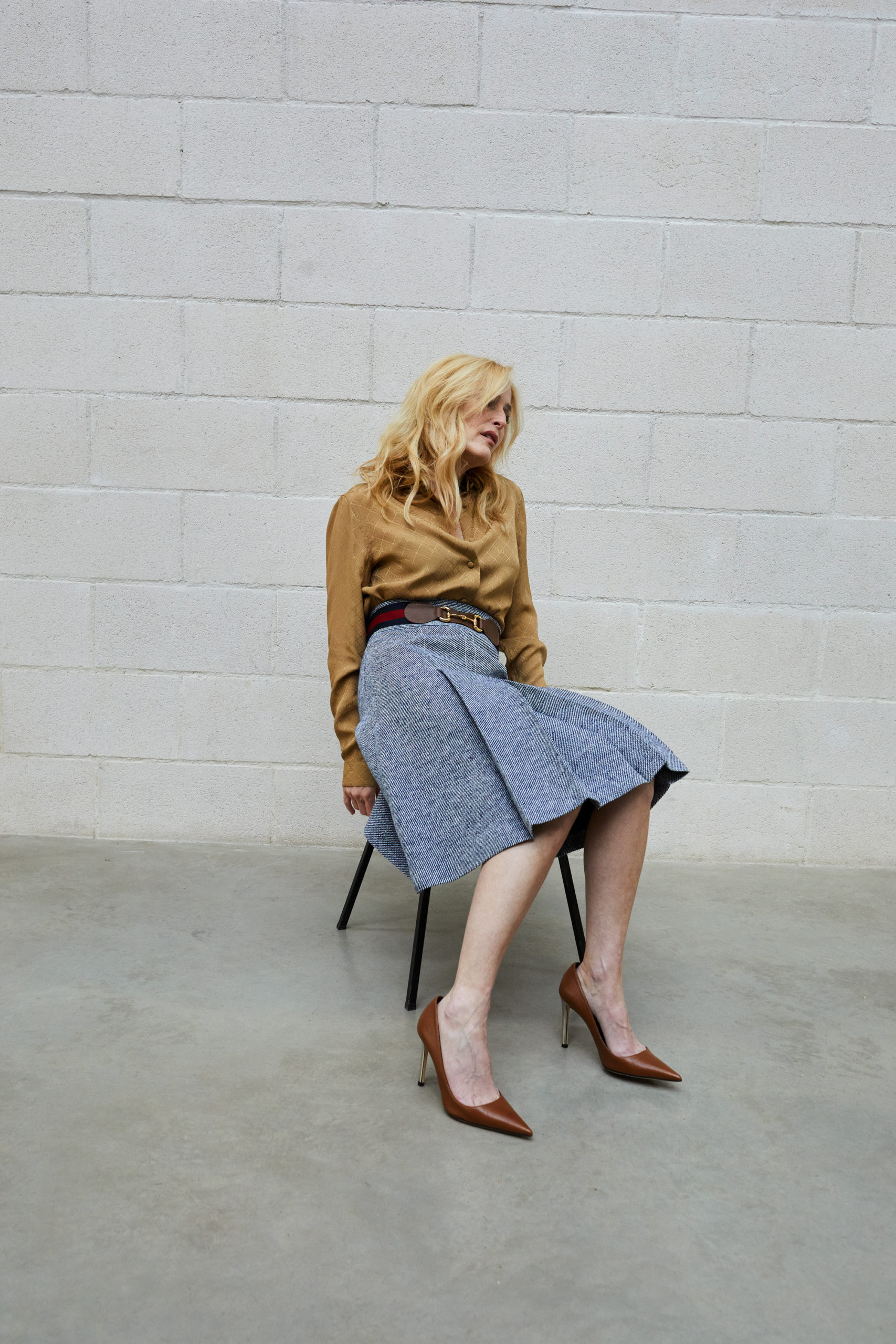
Shirt and skirt by Gucci from Mytheresa. Shoes by Giuseppe Zanotti.
ANDERSON: Yeah, she had a tentative voice.
BONHAM CARTER: “No figurehead here could have done it as well.” Isn’t that fascinating?
ANDERSON: Wow. Could you do me a favor and take a photograph of that page and text it to me?
BONHAM CARTER: Of course. Can I ask, do you act now for the same reasons you did earlier in your life?
ANDERSON: Back then it felt like the only thing that I could do, because I wasn’t particularly good academically. I do remember, and I don’t think I’ve ever said this out loud before, standing in front of the mirror at quite a young age and watching myself become different people. Not in a comic way, like you see in movies where actors are practicing lines. There were no words. It was more shape-shifting in my face. And there was something in me that knew it was useful. I think it’s more that than anything else.
BONHAM CARTER: Is there anything you would have done if you hadn’t done acting?
ANDERSON: I’d probably be a mixed-media artist.
BONHAM CARTER: With me in our Miss Havisham house? I’ll do mixed media, too, in another wing. The only thing is, I don’t know if we could ever live together, because I suspect you’re quite neat.
ANDERSON: I don’t know about neat, but have you ever talked to Vanessa Kirby, the other Princess Margaret, about her lack of neatness?
BONHAM CARTER: Her lack of neatness?
ANDERSON: Oh my god, when we did A Streetcar Named Desire, you could have drawn a line down our dressing room. Let me tell you what you might have seen on any given day. A ballet slipper with a hair extension clipped onto it, or a fork with a bit of vegan cake at the end of it.
BONHAM CARTER: How extraordinary. That’s almost mixed-media art itself.
ANDERSON: Utter chaos. One day I might publish the pictures, with her permission.
BONHAM CARTER: Do you love Scully or do you resent her?
ANDERSON: I don’t resent her at all. But my appreciation of how lucky I was to have a character that was so complex, so iconic, so important for such a long time came later.
BONHAM CARTER: Is she fun to have around?
ANDERSON: If I watch old episodes, I really appreciate her. Especially when we got to do some of the co-medic episodes. It made sense within the realm of who she was the rest of the time that she would have the kind of humor that they wrote for her. It was very ironic and dry. Nobody had ever seen anything like her before. The other thing on television was Baywatch.
BONHAM CARTER: I know. That was a great alternative.
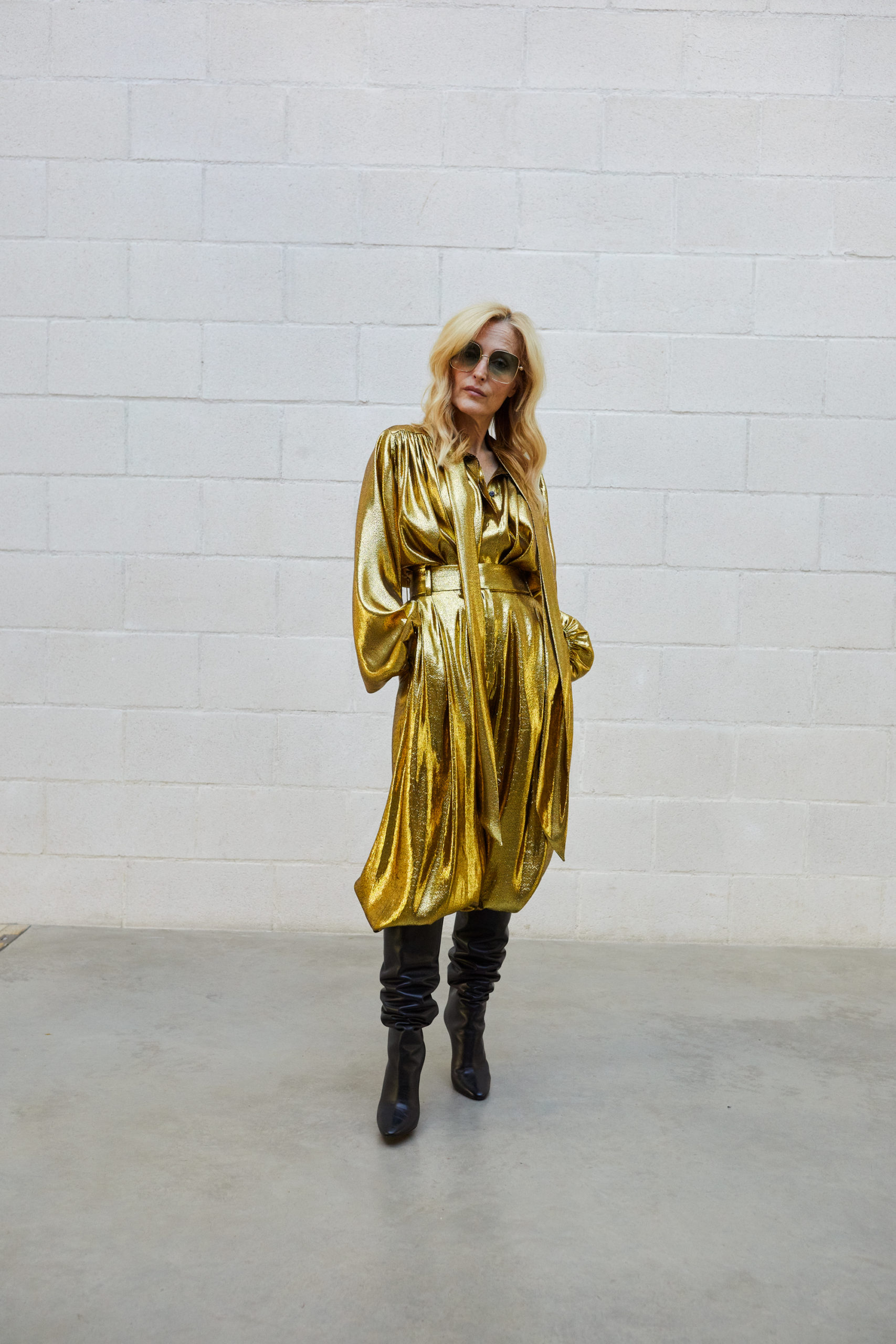
Shirt and Pants by Alexandre Vauthier. Sunglasses by Gucci. Boots by Saint Laurent by Anthony Vaccarello.
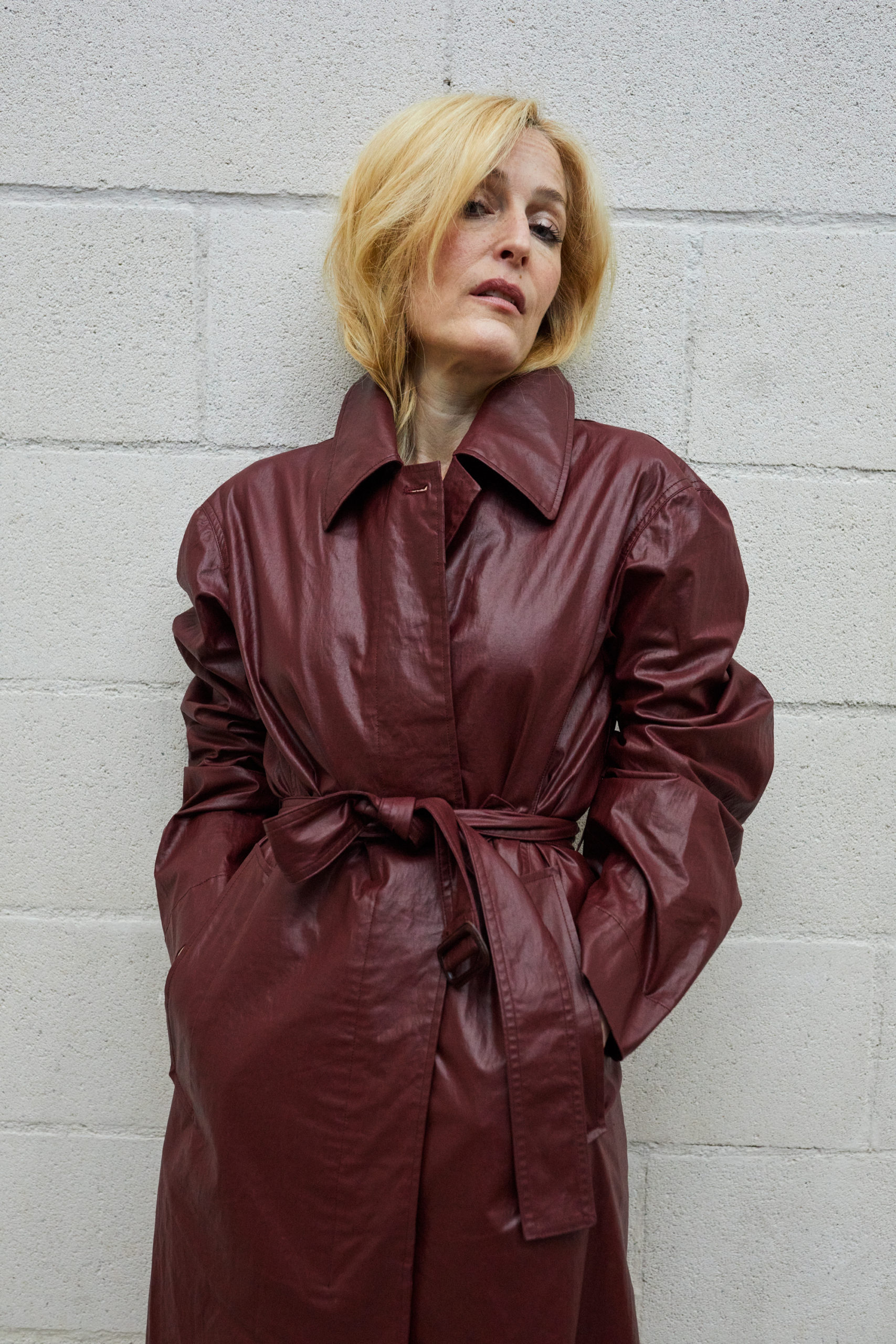
Jacket by Lemaire.
———
Creative Partner: Dovile Drizyte
Hair: James Rowe
Makeup: Florrie White
Photography Assistant: Tomortiz
Fashion Assistant: Amy Lousie Ryall
Post-production: Catalin Plesa

